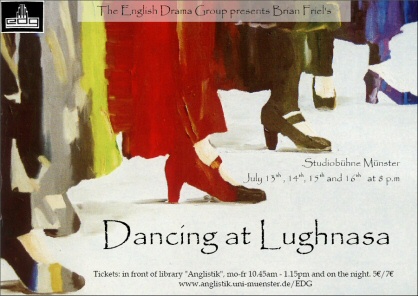
Dancing at Lughnasa
A Play By Brian Friel
Dancing at Lughnasa is Brian Friel’s memory play. The narrator, Michael Mundy, recalls the time of the Festival of Lughnasa in 1936 when he was 7 and lived the rustic life with his mother and her 4 sisters in Ballybeg in Donegal, Ireland. They lead a quiet, country life which is stirred up by the return of their older brother, Jack, a priest who has spent 25 years as a missionary in Africa and whose experiences there have weakened and changed him, and Gerry, Michael’s father, who impregnated Chris and then left before the birth of the child. He is a gadfly, a ne’er-do-well, always on the move and a man who shows his face in Ballybeg only intermittently throughout Michael’s life.
Dancing in all its forms was frowned upon by the Church in the 1930s. Dancing is the central image of the play, from the civilised, ‘tame’ Astaire/Rodgers style of Michael’s parents through Father Jack’s ritual dances of pagan Africa to the wild frenzy of the sister’s Irish reel.
What leads into the titular dance in the play is the awareness of Lughnasa being celebrated – a pagan rite left over from ceremonies honouring Lugh, the god of the sun worshipped by the ancient Celts. Two meanings oscillate in the feast of Lughnasa: connotations of sexual awakening and transformation and the beginning of the darker days of the year. So the dance is not a catalyst into a bright future for the Mundy sisters. On the contrary, it is rather the last orgasmic manifestation of the women’s joy of life, the last fling of the spinsters — where hope and passion and the present meet before the tragic evening of their day sets in. What lies ahead is the sad break-up of a family.
And yet the play does not end on a note of hopelessness. In Michael’s memory the past is – despite the acknowledged tragic fates of the family members – illogically enchanted. The play denies pessimism.
The sisters:
Kate – is the hard-faced, puritanical sister who earns most of the meagre family income by teaching. She is the disciplinarian of the family, the spoilsport who tries to keep everyone in line and the family functioning.
Rose – a sweet and mildly retarded woman who, like her younger sister Chris, is made a fool of by a man. Nevertheless she maintains a lovely kind of dignity.
Agnes – is the quiet sister who spends her days knitting gloves until the glove factory comes to town. Her quietness may well hide the deepest well of yearning of all the sisters.
Chris – the unmarried mother who – normally pragmatic and equipped with a sharp intelligence – must almost believe the lies of the usually absent Gerry to protect herself and her child.
Maggie – is the life force of the family. She is the earthy, pagan, funny, sexy woman who invariably finds sunshine in the shadows.

